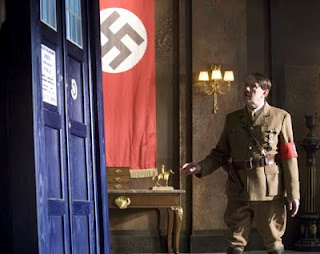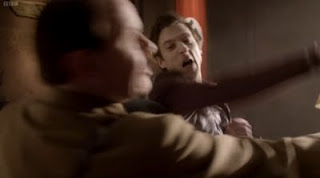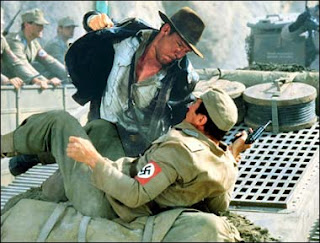James Willetts. Doctor Who. Review. Need we say more?
There’s something wonderful about Nazis. Not in a weird way – I’m not one of those people. But if you want someone who can exist as simply a villain, with no qualms, morality or care for their welfare, Nazis are brilliant. Always have been. Forget Islamic terrorists, the Soviets or whatever super villain society you can conjure up; if you want an unquestionably evil bad guy, you have to go with Nazis*.
And Hitler, now Hitler is just a whole other level. If Nazis are bad, then the chief Nazi must be so much worse.
So when you get an episode in which your time travelling heroes set off to kill Hitler; well, that’s wonderful. It’s the ultimate question of time travel. What would you do if you had the chance to stop the greatest villains in history? Do you assume that you have a responsibility to try and improve things, or do you recognise that changing history has consequences which can’t be foreseen?
The idea of an alternate past, with Hitler as the hinge upon which history swings, is a common one. It’s one of my favourite genres, from John Birmingham’s future tech thrown back in time, through the Harry Turtledove insanity of an alien invasion in the midst of World War Two, to the Stephen Fry bleak buster Making History – all share the common seeds of just how quickly the Second World War could get much, much worse**.
I was surprised, therefore, at how much Doctor Who deviated from that script. No super plot to change history, no attempt to establish a Third Reich lasting a thousand years, or to replace Hitler with Mecha-Hitler, or Space-Hitler, or a clone of Hitler***. Just a mission to punish a war criminal and a whole lot of answering questions about what happened last season. The whole thing was wonderful. Wonderful!
It’s a straight choice; what do you do when you have the chance to punish the guilty? Not in a way that prevents the evil. I think that the suggestion was that a facsimile of Hitler would be left behind. The war would go on, millions would die, but Hitler would not be around to see it.
But it’s more complicated than that. What do you do when the enemy being brought to justice is not the absolute face of evil but your friend, or a child? Someone you trust and love.
There’s a marvellous switch out here too because, when we first learn of the change in targets, from Hitler to someone else in the room – the greatest war criminal in history – we can only assume that it’s the Doctor. That’s the pattern that’s been built up over the past two seasons (or season and a half, depending on how you see it). The universe at large sees the Doctor as a meddler, and not without due cause. After all, this is someone who routinely murders alien races, who kills his enemies by the thousands and happily commits xenocide on a whim.
So the reveal that Mels is River Song, whilst not totally surprising, it dispensed with far quicker than expected. The whole episode has a refreshing habit of subverting the standard format of allowing plots and questions to build without an answer.
Whilst there is still much left to come to fruition, there is a real sense that we’re going to start getting answers. Part of this is the way that the River Song/Melody Pond storyline is being laid to rest, even as the Silence is fleshed out. We know where some of this will end, now it’s just a question of where the ride takes us in getting there.
The bit that I love about Moffat’s Doctor is that he’s smart; Sherlock smart. The whip-crack one-up-man-ship on show between him and Melody is fantastic, and it makes total sense that someone designed to kill the Doctor would be able to outwit even him. The demonstration of mind-fu was wonderful.
But at its heart this wasn’t a story about time travel, or Nazis, or even about a miniature ship posing as robotic duplicates dispensing justice throughout time and space. This was all about the Doctor redeeming Melody Pond, turning her from a psychotic alien death machine to a valued and trusted ally through dialogue and self-sacrifice. No xenocide. No theatrics. Just one man who loves those he travels with and really, really wants everyone to just get along.
This was about how River Song came to be who she is, how nurturing friends and the love of those around you can help people to overcome the baggage they carry with them.
For all that talk about Demon’s Run, this may well be the Doctor rising higher than ever before.
*It’s why everyone loves Raiders of the Lost Ark and Last Crusade, but ignores Temple of Doom. It’s why Hellboy and Captain America are awesome; they’re the product of a superwar against Hitler. I mean, yeah, it’s great that you’re an arms dealer with a conscience and a suit of armour now, but I bet you never punched out Hitler, did you?
**Turtledove’s In The Balance series is about a race of lizard warriors who invade Earth in the middle of World War Two, eventually enter a cold war with the Third Reich, Soviet Union and America and are finally superseded by the more versatile and capable humanity. It’s just about less insane than I, Zombie, a book in which a zombie detective fights British Secret Service werewolves before eating a hyper-evolved brain and summoning an alien army to invade London. It’s AWESOME in a way that defies comprehension, even while you read it (especially while you’re reading it)!
***None of which are as good as the Hate-Monger as first seen in Fantastic Four #21.




